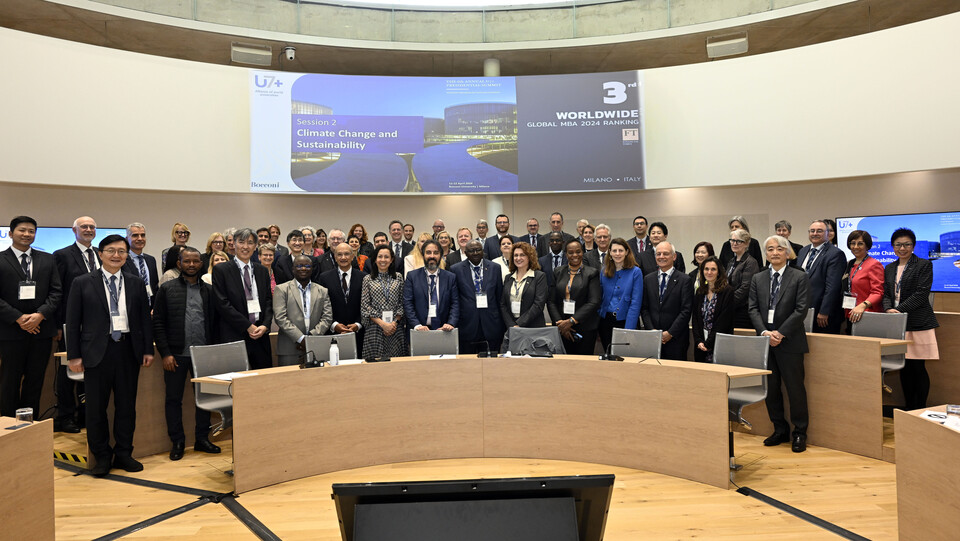Universities Call on G7 Leaders to Increase Access to Education Globally

University leaders from 18 countries met at Bocconi University this week for the U7+ Presidential Summit. In their joint statement, they called on G7 leaders to work with them to support increased global access to higher education as a means of enhancing inclusion, building the next generation of leaders, and contributing to stable, flourishing societies.
“We believe supporting the continued development of a strong higher education sector that provides equitable access to quality education needs to be done in partnership with governments,” the 2024 U7+ Statement on Global Access to Higher Education reads. It states that this should be approached with the goals of “transforming individual lives, driving economic growth and global development, and ultimately providing opportunities for communities everywhere to achieve well-being and prosperity.”
At the Summit, themed Inclusive Education for Inclusive Societies, U7+ Alliance members recognized that equitable access to higher education poses a challenge within individual institutions, between them, and between regions of the world. They committed to work within their own institutions and across institutions to support access to higher education at all phases of the academic pipeline from admission to graduation, including fostering an inclusive and supportive culture on our campuses where all students, faculty, and staff can flourish.
In the statement, U7+ university presidents requested commitment from and partnership with the G7 in four key areas, including a continued focus on developing high-quality and inclusive education systems from primary education through to higher education, supporting investment in higher education in low- and middle-income countries, providing funding to support students from marginalized communities locally and globally, and by supporting and prioritizing visas for students and scholars fleeing oppressive regimes, armed conflict or threats of conflict.
The presidents of 46 U7+ universities formally committed to the statementwhich was delivered to Anna Maria Bernini, Italian Minister of University and Research, on 11 April as a representative of the Italian government who is playing host to the G7 summit this year.
From the University of Mannheim, President Prof. Dr. Thomas Puhl and Prof. Dr. Thomas Fetzer, Vice President for Strategic Planning, Internationalization and Equal Opportunity, took part in the meeting in Italy. Since 2022, Puhl has been one of eight members of the Presidential Steering Committee, which represents the Alliance to the outside world. “The statement represents not only the shared commitment, but also the absolute conviction of the U7+ members that access to education is essential for solving the greatest global challenges. As universities, we have a responsibility to make this access as low-threshold as possible for students from all population groups, but we need the support of politicians,” Puhl says about the statement, which he signed on behalf of the University of Mannheim. At the Summit in Milan, Puhl chaired the session on sustainability and climate change. “Sustainability and access to education are inextricably linked. It is no coincidence that quality education is one of the United Nations’ 17 Sustainable Development Goals,” says Puhl. In the session, the commitment of the U7+ members to offer all students courses on climate protection and sustainability topics and to reduce their own CO2 emissions was emphasized and illustrated with practical examples. Moreover, the participants emphasized that these necessities must be repeatedly brought to the attention of politicians based on facts and evidence.
“It is undisputed that universities and the people they educate make crucial contributions to tackling climate change, social inequality and other major challenges of our time,” adds Fetzer. “Transnational university networks such as U7+ are particularly important to ensure that different national perspectives and concerns are reflected in the knowledge we make available to policymakers and society, especially at an international level.”
See the full statement of the U7+ Alliance
About the U7+ Alliance
The U7+ Alliance is an international coalition of universities primarily from the G7 member states that aims at making a scientific contribution to help solve the major social and political issues of our time. Alliance members meet annually to set a common agenda and identify key areas for coordinated action. Together, the presidents of the U7+ universities commit on behalf of their institutions to concrete measures to address the world's most pressing challenges at the local, regional and global levels.
General information about the U7+ Alliance and past declarations: https://www.uni-mannheim.de/en/about/international/u7/
